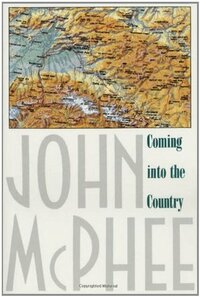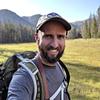Take a photo of a barcode or cover
reflective
slow-paced
“If anyone could figure out how to steal Italy, Alaska would be the place to hid it." What a vivid way to describe Alaska's immensity. 'There has been a host of excellent books on Alaska. My favorite until recently was Joe McGinnis's [b:Going to Extremes|71804|Rachael Ray's 30-Minute Get Real Meals Eat Healthy Without Going to Extremes|Rachael Ray|http://photo.goodreads.com/books/1170791372s/71804.jpg|69524] but John McPhee's Coming Into the Country is wonderful, too.
McPhee's book is divided into three parts: first an exploration of wilderness described during the course of a canoe/kayak trip down the Salmon River. Much in the manner of the river, his descriptions meander into all sorts of eddies and whirlpools. His description of bush pilots is priceless. On one occasion he is flying (a regularly scheduled airline, mind you) in a single engine plane in horrible weather. The pilot is skimming the trees to find landmarks because he can't see anything. He has a map on his lap, but suddenly hands it to a passenger to help figure out where they are. "I had been chewing gum so vigorously that the hinges of my jaws would ache for two days."
Stumbling on a grizzly bear in a blueberry patch (fortunately upwind), he muses on the best way to survive a grizzly's charge - no consensus of opinion, but most survivors believe the best thing to do is stand absolutely still and shout as loudly as possible, for that is the least likely reaction the bear, which does not have good sight, would expect of game. Running away is useless for grizzlies are very fast. They are also quite coordinated. They enjoy schussing down snow-covered mountains at 96 feet/second through trees and around boulders only to screech to a stop, stand up and walk away, just before going -over the edge of a cliff.
The second part of the book discusses the Alaskan government's search for a new capital and the conflict that generated. Juneau really makes a lousy site because of its remoteness, not to mention its horrible landing approach to the airport. Alaska attracts very independent and anti-authoritarian types of people so it witnesses a battle between those suffering from the "Sierra Club Syndrome" or others fondly embracing the "Dallas Scenario."
Many of these folks are affectionately profiled in the third section. John Cook, for example, has consciously tried to eliminate the need for money and authority. He tries to live on $1,500 a year (this was written in the mid seventies); he has a series of [b:trap line|69367|Trap Line|Carl Hiaasen|http://photo.goodreads.com/books/1170705366s/69367.jpg|2689]s and rarely uses a parka, even at -30'. The closest town is Eagle, about 30 miles away via dog sled, with a population of about 100. Almost all live by the ut restrictions on code, "Never put restrictions on any individual.... Up here they ain't gettin' you for spittin' on the sidewalk."
Ironically, most moved there for the space, yet land is less available (as of 1977) than in the lower '48 because when Alaska became a state deals were made with the native Americans and the federal government to set aside almost the entire state as either a reservation or park land. Whereas before statehood someone could build a cabin 80 miles from nowhere, now a government helicopter might fly over and throw them out. Homesteading no longer exists, but in Alaska that loss seems especially poignant in territory where you might have to fly somewhere to take a shower.
McPhee's book is divided into three parts: first an exploration of wilderness described during the course of a canoe/kayak trip down the Salmon River. Much in the manner of the river, his descriptions meander into all sorts of eddies and whirlpools. His description of bush pilots is priceless. On one occasion he is flying (a regularly scheduled airline, mind you) in a single engine plane in horrible weather. The pilot is skimming the trees to find landmarks because he can't see anything. He has a map on his lap, but suddenly hands it to a passenger to help figure out where they are. "I had been chewing gum so vigorously that the hinges of my jaws would ache for two days."
Stumbling on a grizzly bear in a blueberry patch (fortunately upwind), he muses on the best way to survive a grizzly's charge - no consensus of opinion, but most survivors believe the best thing to do is stand absolutely still and shout as loudly as possible, for that is the least likely reaction the bear, which does not have good sight, would expect of game. Running away is useless for grizzlies are very fast. They are also quite coordinated. They enjoy schussing down snow-covered mountains at 96 feet/second through trees and around boulders only to screech to a stop, stand up and walk away, just before going -over the edge of a cliff.
The second part of the book discusses the Alaskan government's search for a new capital and the conflict that generated. Juneau really makes a lousy site because of its remoteness, not to mention its horrible landing approach to the airport. Alaska attracts very independent and anti-authoritarian types of people so it witnesses a battle between those suffering from the "Sierra Club Syndrome" or others fondly embracing the "Dallas Scenario."
Many of these folks are affectionately profiled in the third section. John Cook, for example, has consciously tried to eliminate the need for money and authority. He tries to live on $1,500 a year (this was written in the mid seventies); he has a series of [b:trap line|69367|Trap Line|Carl Hiaasen|http://photo.goodreads.com/books/1170705366s/69367.jpg|2689]s and rarely uses a parka, even at -30'. The closest town is Eagle, about 30 miles away via dog sled, with a population of about 100. Almost all live by the ut restrictions on code, "Never put restrictions on any individual.... Up here they ain't gettin' you for spittin' on the sidewalk."
Ironically, most moved there for the space, yet land is less available (as of 1977) than in the lower '48 because when Alaska became a state deals were made with the native Americans and the federal government to set aside almost the entire state as either a reservation or park land. Whereas before statehood someone could build a cabin 80 miles from nowhere, now a government helicopter might fly over and throw them out. Homesteading no longer exists, but in Alaska that loss seems especially poignant in territory where you might have to fly somewhere to take a shower.
adventurous
informative
inspiring
slow-paced

